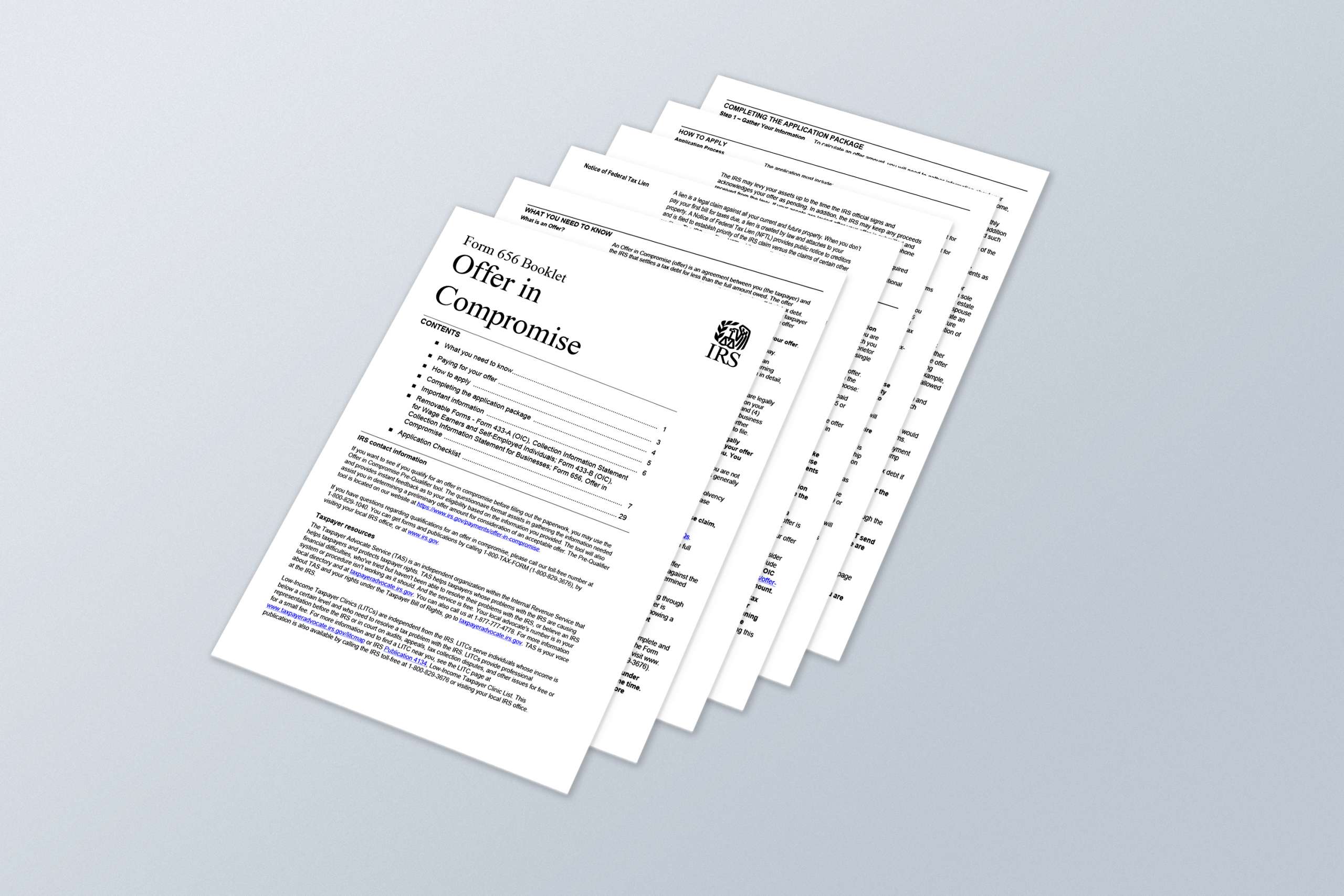OFFERS IN COMPROMISE
While in reality a very small percentage of tax resolution cases are actually resolved by means of an offer in compromise, this could be the right solution for you if you qualify. Be aware there are tax resolution firms out there who use the possibility of an offer in compromise as a foot in the door and take your money, only to tell you later that you do not qualify for an offer and then try to take your money again to find other resolution possibilities.
Generally, an offer in compromise is an agreement with the Internal Revenue Service to pay less than the full amount of your outstanding debt. The IRS follows strict guidelines with an offer in compromise. When accepting an Offer In Compromise, the IRS looks at it as a business decision with the philosophy that it is better to get something now, rather than the likelihood of never getting paid at all. The taxpayers who have the most success with an offer in compromise generally either have serious health problems or are elderly and on a fixed income, keeping them from earning enough money to reasonably be expected to pay off the debt.
We have been successful in helping clients receive very favorable offers in compromise. If you have any questions or need help, call us at at 1-800-408-3122 or contact us at taxhelp@iowetaxes.com for a free consultation.
How do I know if I may qualify for an Offer in Compromise?
Making an Offer in Compromise is one of the very few times in life that it is better to have no assets, owe a lot of money, and have a low chance of coming into money to be able to pay your debt any time soon. As we mentioned earlier, age and physical issues that demonstrate an inability to earn money to pay the debt are important factors in being approved for an Offer in Compromise.

If I have no money, how can I make an offer and then pay if my offer is accepted?
This is a very good question, and one that the IRS will want answered before approving your offer. Commonly the money is either borrowed or gifted from a family member or a friend to help you get back on your feet. Remember that if you truly have little hope of paying a substantial amount of the debt, the Internal Revenue Service may accept a very low amount compared to your outstanding debt, because they understand that it is better to collect something now than to face the very real possibility of never getting paid anything at all.
Doubt as to Collectibility
This is the most commonly form of an offer in compromise, showing the taxpayer is unable to pay the full amount owed.
Doubt as to Liability
This form of an offer in compromise is sometimes used when there is a legitimate argument as to the validity of a tax debt.
Effective Tax Administration
With this seldom approved form of an offer, the taxpayer agrees with the amount of the liability to the IRS and the taxpayer admits they do have the assets to pay in full, but it would not be fair and equitable or against public policy to collect the full amount owed.

Questions You Might Have
An Offer In Compromise is a tax settlement that the Internal Revenue Service offers that in some situations will allow taxpayers to settle their debt in full with the IRS for less than they owe.
While an Offer In Compromise is by far not one of the most common ways that a tax debt is ultimately resolved, if you can demonstrate to the satisfaction of the IRS that you do not currently have the money or other assets to be able to pay off the debt, and your current income and situation offers little realistic hope of getting the money to pay within a reasonable period of time, the IRS may be persuaded to accept a payment from you for less than the full amount due. You will have to have filed all required tax returns before you can have an Offer In Compromise considered, as well as having made any required current period estimated tax payments and federal tax deposits.
What do I need to be careful of when submitting an offer for an OIC to the Internal Revenue Service?
There is a collection statute expiration of ten years on most IRS debt after which time the IRS is unable to collect and any remaining balance is written off. An Offer In Compromise will “stop the clock” on this period during the time your offer is being considered. You may therefore not want to do an offer if the statute expiration date is nearing.
Also, if you are considering filing for bankruptcy, you should consult with an attorney as you cannot file for an Offer In Compromise if you have filed bankruptcy.
The process to get approved for an OIC is not a quick one. While it is possible to have the process wrapped up in a few months in some straightforward situations, it is not unusual for an Offer In Compromise to take in excess of a year from the initial offer to final acceptance.
Collection activity will be suspended while the Internal Revenue Service considers your offer. However, a tax lien can still be filed during this time. Also, as noted above, the legal assessment and collection period is extended.
To qualify for an OIC, The Internal Revenue Service is going to require a lot of detailed information and paperwork about all your finances and your personal situation. It is important to understand this up front, because a lot of people are not comfortable sharing all this detailed personal information. The IRS will also require a lot of backup documentation which they will go through in detail, including at least your most three recent bank statements of all accounts. After reviewing the information provided, they will likely also come back asking for more specific information which must be timely responded to.
If your Offer In Compromise is rejected and you don’t agree with the decision, you have thirty days to appeal the decision. Especially if there are details the Internal Revenue Service was not aware of or did not consider and more information can be supplied, you should definitely consider appealing the decision. Alternatively, you also have the right to start the process over again with a new Offer In Compromise.
If the Internal Revenue Service accepts your OIC, it is very important that you follow all terms of the agreement. This will include filing all required tax returns timely, and making all IRS payments timely with the Internal Revenue Service. If you do not comply with all the terms of the agreement going forward, the IRS can void the agreement and make the entire amount of your debt due again. Compliance during and after an Offer In Compromise is critical to the ultimate success of your offer.
Yes, in fact an Offer In Compromise is turns out to be the best solution in a small minority of cases. Assuming what the Internal Revenue Service says you owe is correct, if cannot currently pay your debt in full, you can possibly get a satisfactory installment agreement, a partial pay installment agreement, or show the IRS why they should move your account into a currently not collectible status.
Call us at 1-800-408-3122 or email us at taxhelp@iowetaxes.com for a free no obligation consultation.



